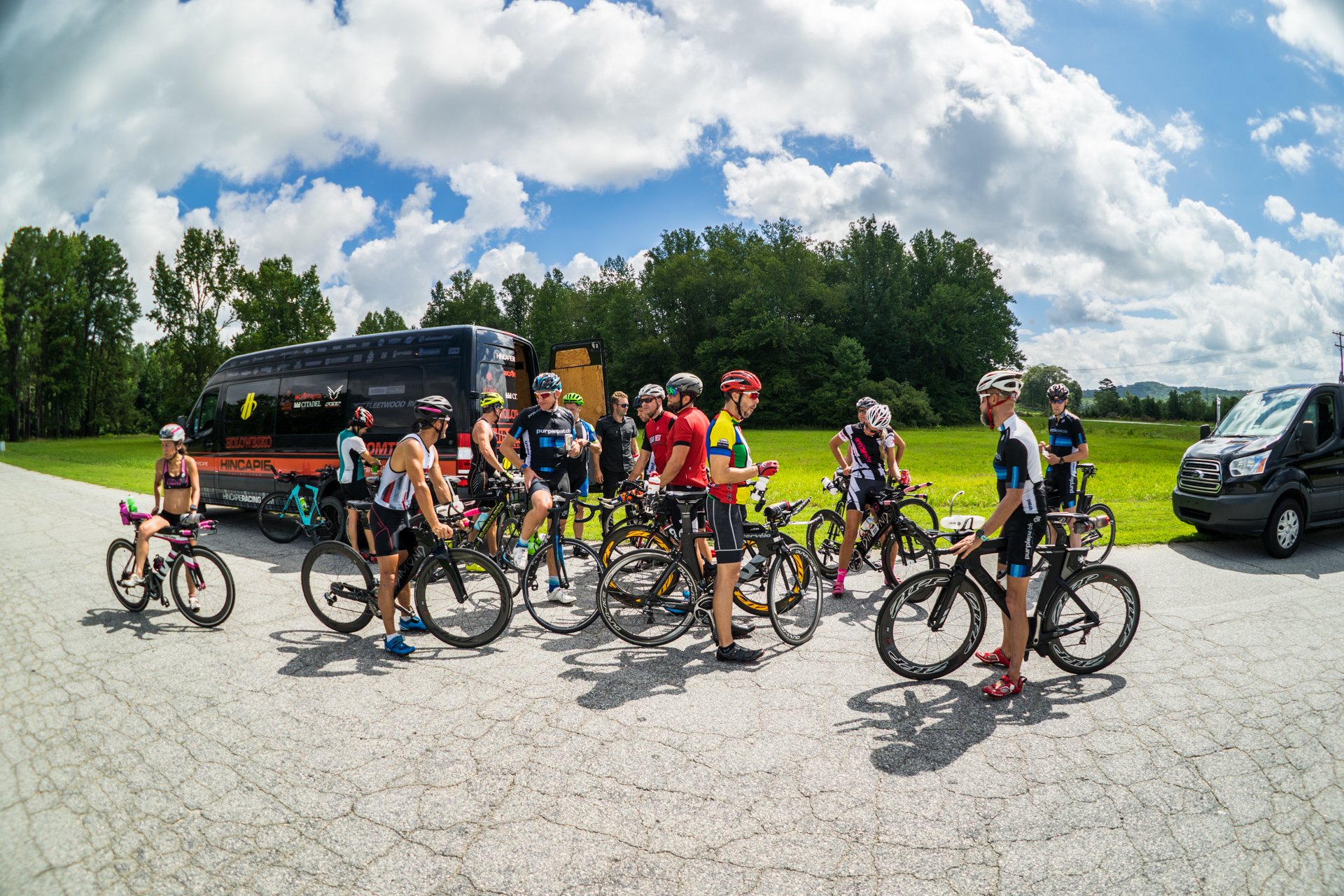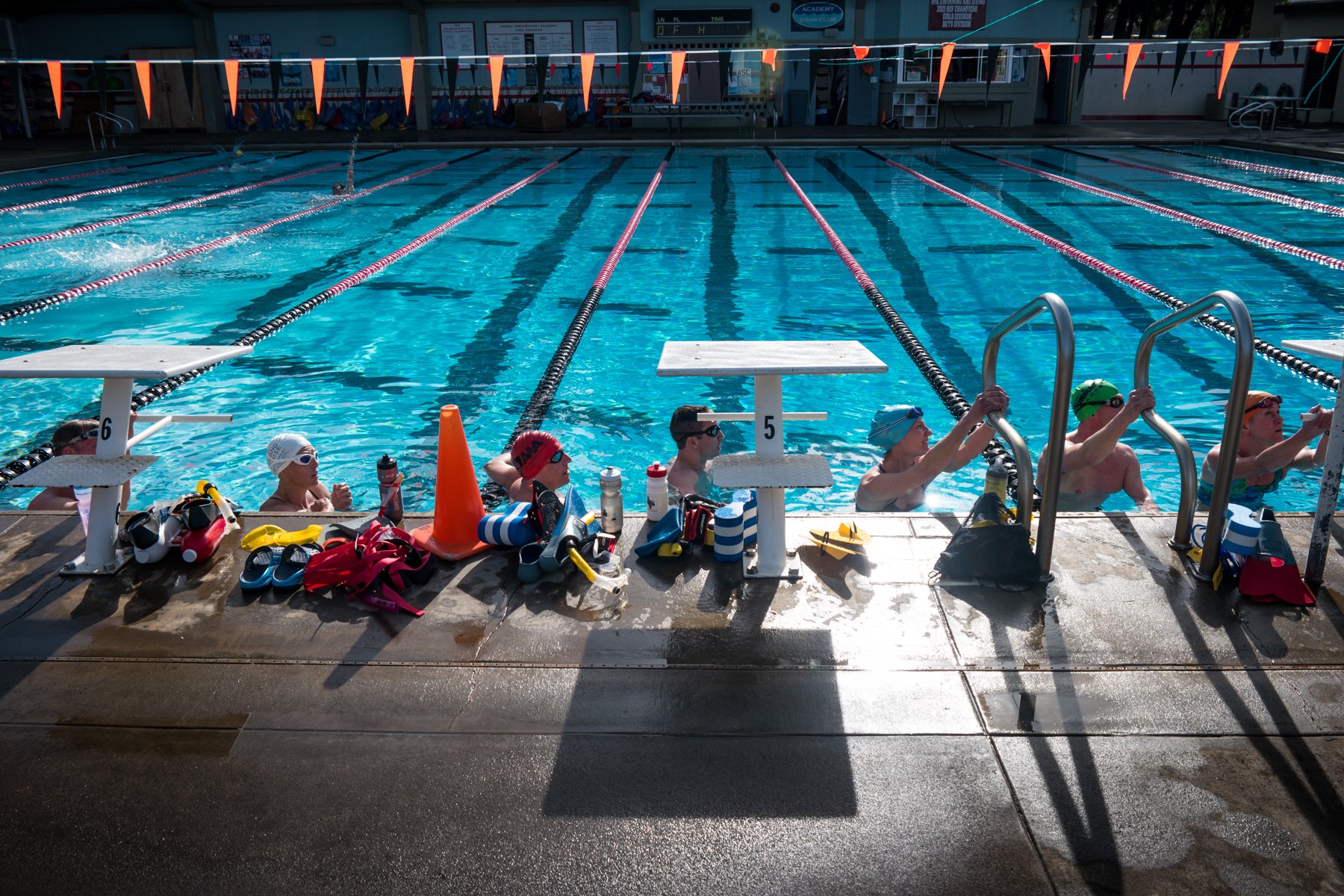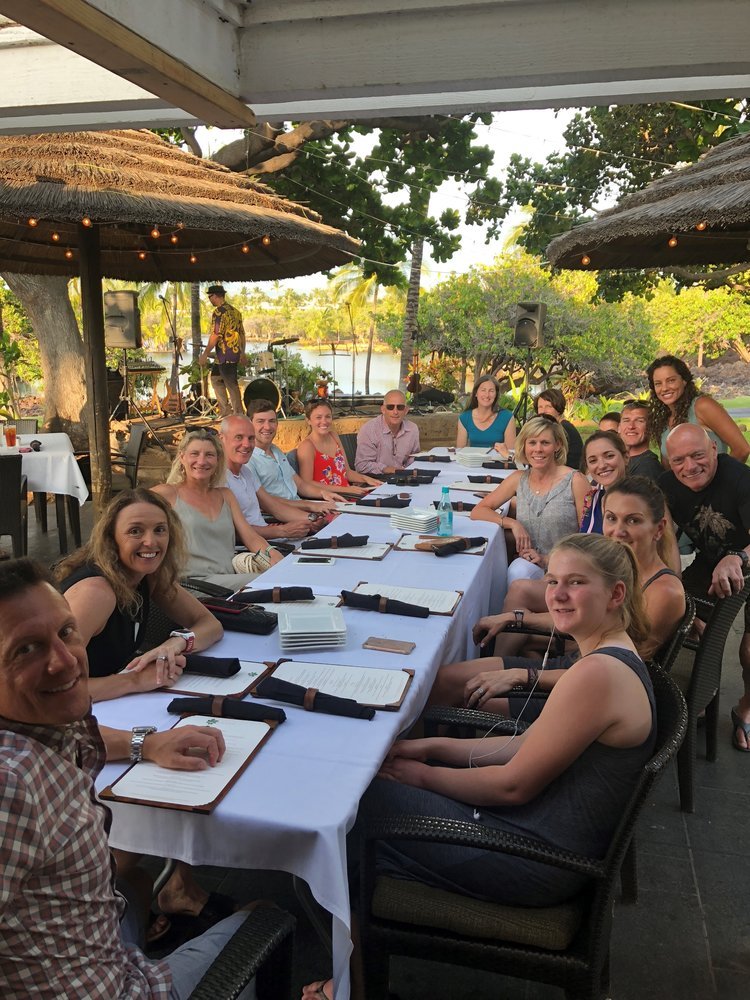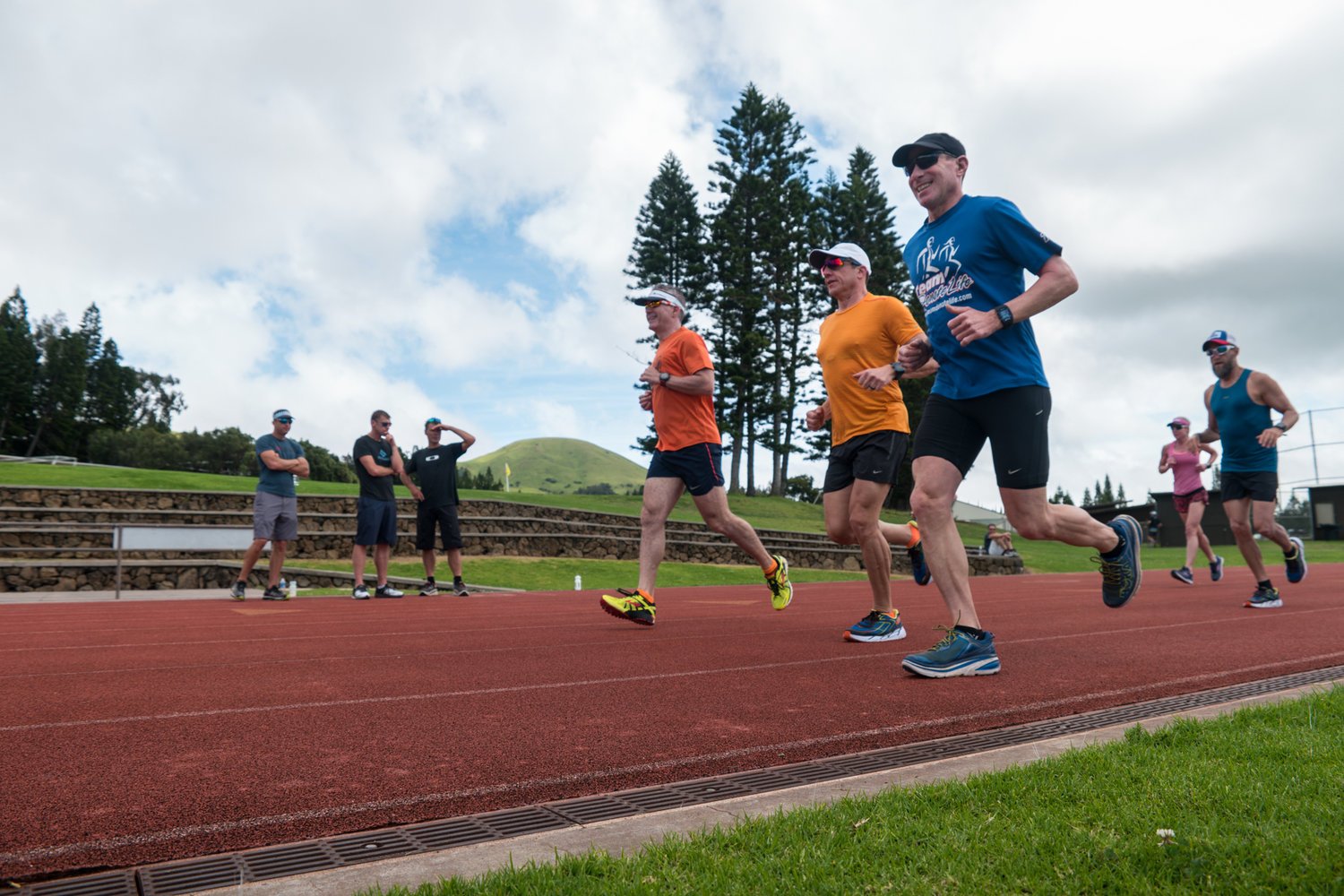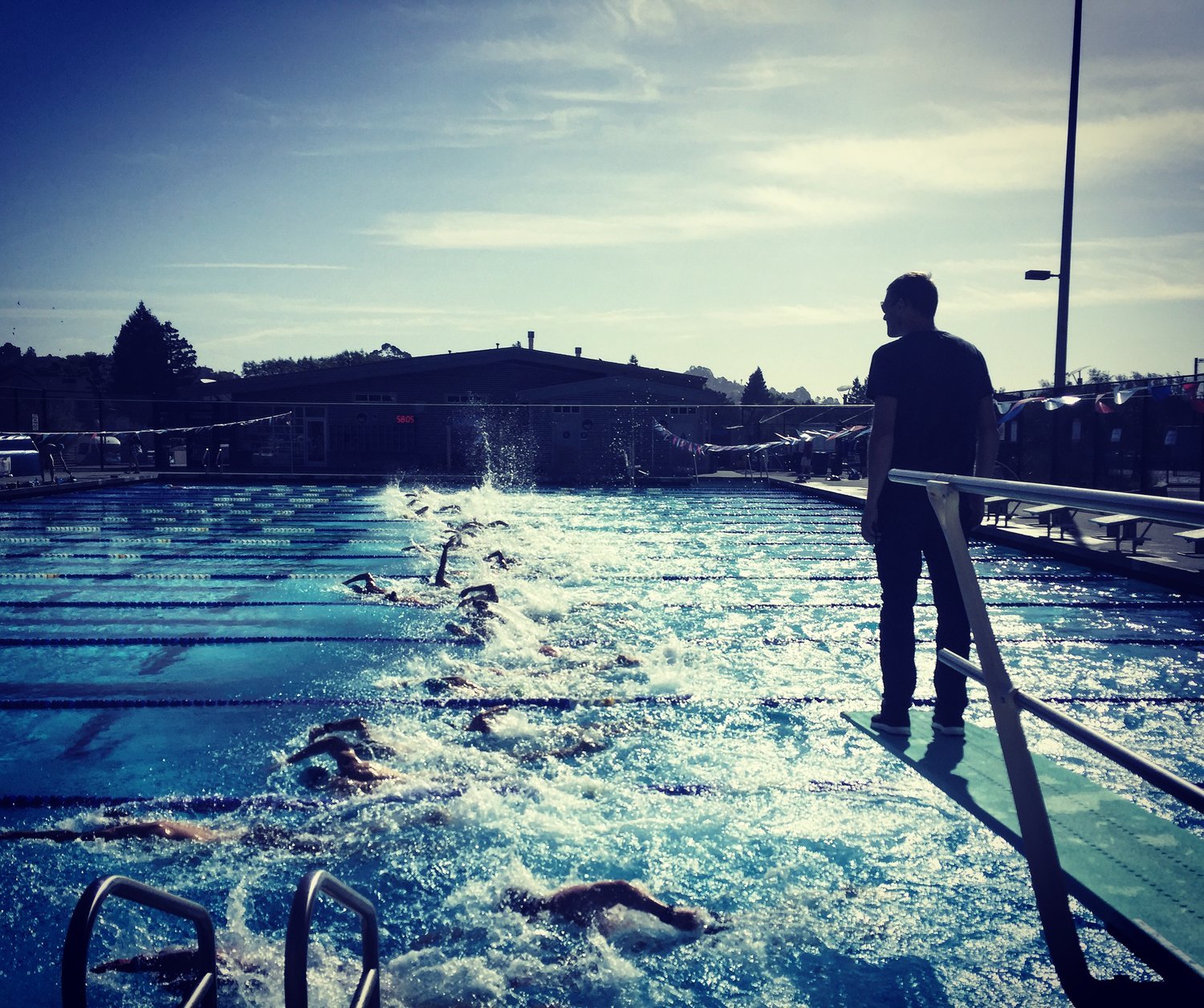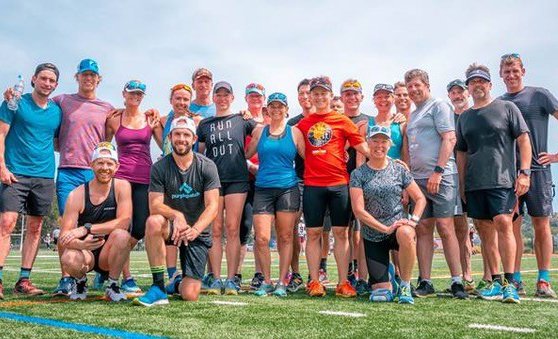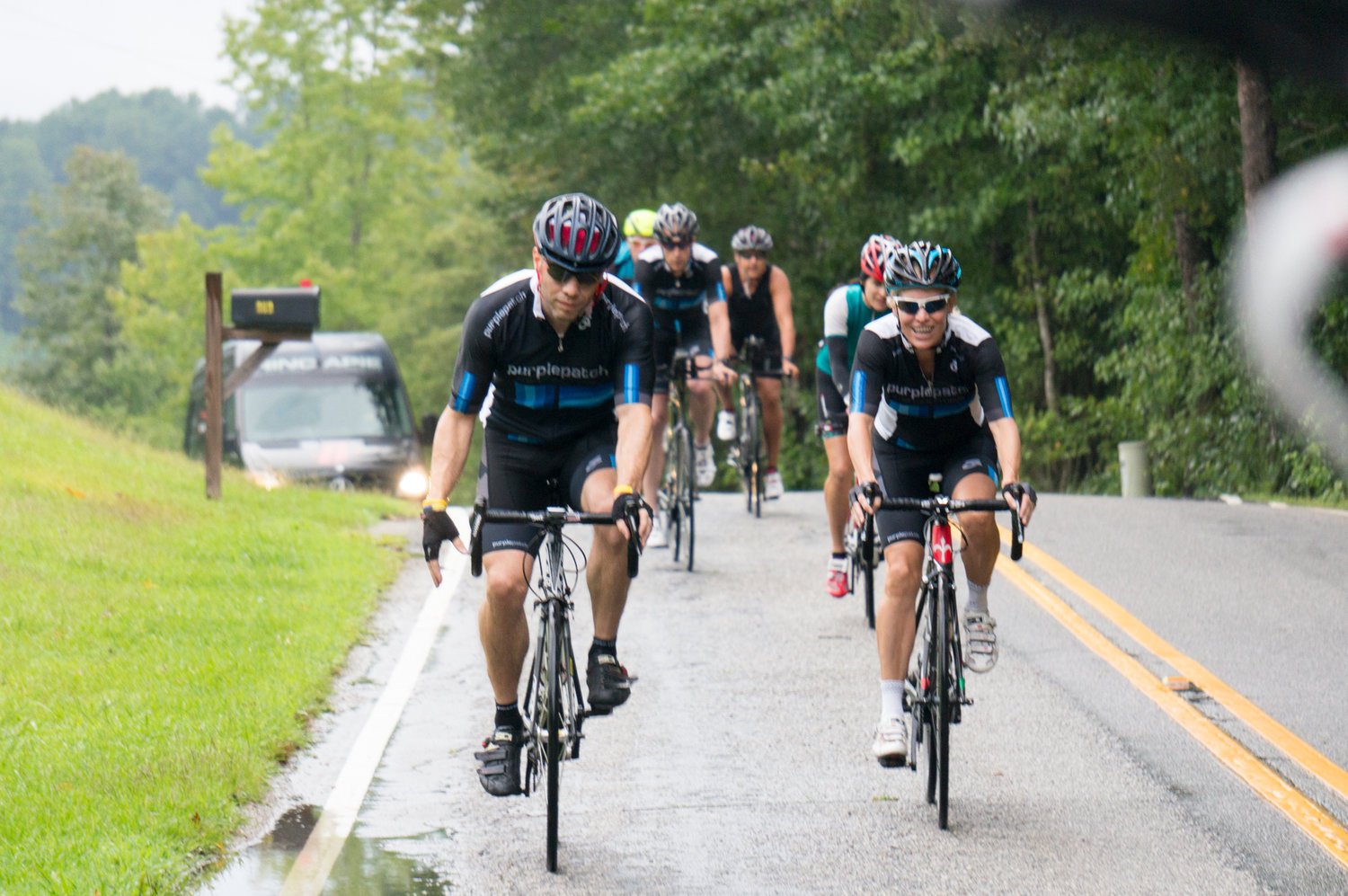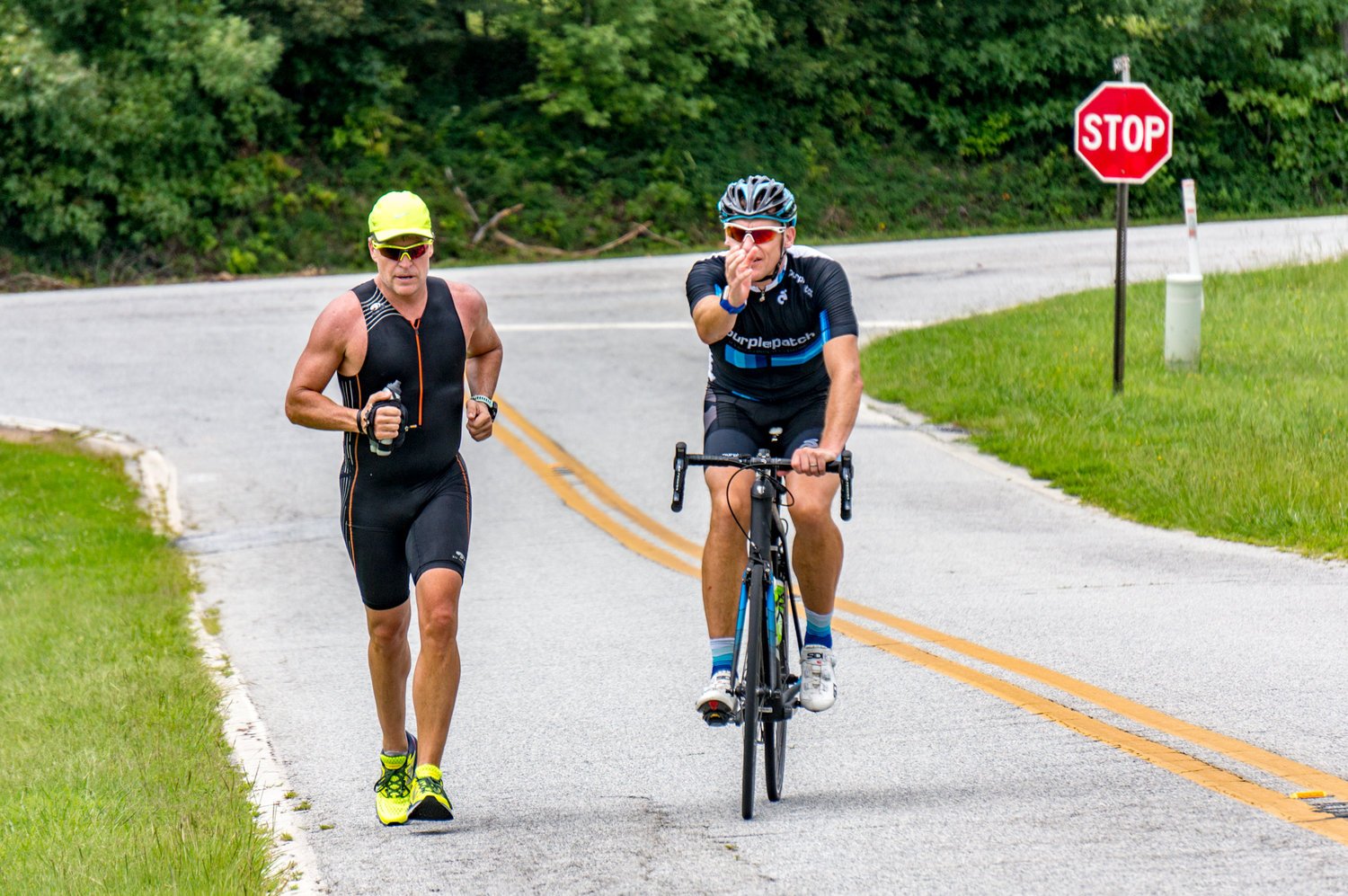Episode 301: Three Hidden High-Value Aspects of a Training Camp Experience
Follow the Purple Patch Podcast at:
APPLE PODCASTS - SPOTIFY- AMAZON MUSIC - GOOGLE PODCASTS - YOUTUBE
We continue to kick off the year with our on-location podcasts from the 2024 Purple Patch Kona Camp. This year, we have 25 athletes who have put in some hard work and learned some valuable lessons.
In this week's episode, IRONMAN Master Coach Matt Dixon talks about the importance of training camps and what athletes gain from coming together with like-minded individuals to be coached through the experience.
Matt highlights three often overlooked components every athlete and coach should consider, as well as the main reasons why we have so many people returning to our training camp experiences year after year.
Matt emphasizes three often overlooked components that athletes and coaches should consider. He also explains how these three components are part of the main reason athletes choose to return to our training camp experiences year after year.
While training camps seem to be a retreat where athletes simply hammer their way through a training program, an effective training camp experience is much more nuanced.
Matt emphasizes the significance of training, education, skill acquisition, coaching experience, and the cultivation of practices. However, he primarily focuses on three main ideas that are fundamental to the training camp experience. These ideas not only help you succeed in sports but also provide resilience, purpose, and clarity in all of your endeavors.
We believe that investing in a training camp can be one of the best decisions an athlete or performance-minded person can make in their journey, and we hope you consider Purple Patch for your next training camp experience or your first.
Click the link for more information on our 2024 Purple Patch Performance Camps. - SIGN UP NOW for our Napa Valley and South Carolina Training Camps
Episode Timestamps
00:00 - 03:43 - Welcome and Episode Introduction
03:50 - 05:53 - Matt's News-ings
06:00 - 36:46 - The Meat and Potatoes - Episode 301: Three Hidden High-Value Aspects of a Training Camp Experience
Additional Episodes on Training Camps
Episode 251: Lessons From Leaders - Purple Patch Kona Camp 2023
Purple Patch and Episode Resources
Purple Patch Video Podcast and More
Click here for the SPECIAL Fuelin Landing Page
We've reimagined indoor cycling - Find out more about Purple Patch Bike Live & On-Demand
Come try the Purple Patch Tri-Squad
More on Purple Patch Bike Live & On-Demand
Get a Free Taste of Purple Patch Strength
ORDER NOW - 2024 PURPLE PATCH APPAREL
Everything you need to know about the Purple Patch Methodology
Join the Purple Patch Team
The Purple Patch Center is Open - Learn More and Schedule a Visit
Purple Patch Coaching Consultation
Learn more about our Tri Squad Program
This episode is sponsored by our collaboration with INSIDE TRACKER. Inside Tracker and Purple Patch- Receive 20% off their services with code: PURPLEPATCHPRO20
Ask Matt Anything - Leave a voicemail question for Matt
Learn more about Purple Patch Squad High-Performance Training Program
Join Bike Squad - Don’t just exercise and work out; learn to train with our structured online cycling program
Join Run Squad - Increase your running performance through our progressive, multi-sport approach to running
Learn more about Purple Patch Fully Customized 1:1 Coaching
Learn more about Purple Patch Strength Programming
Stay Up-to-Date with Purple Patch News and Events
Full Transcript
Matt Dixon 00:00
Hi. I'm Matt Dixon and welcome to the Purple Patch podcast. The mission of Purple Patch is to empower and educate every human being to reach their athletic potential. Through the lens of athletic potential, you reach your human potential. The purpose of this podcast is to help time-starved people everywhere integrate sport into life.
Matt Dixon 00:24
It's early in the year, your whole year is ahead of you. And me? Well, what's become an annual tradition now is I like to get kickstarted with a Purple Patch training camp in one little piece of oasis here in Hawaii. Yes, and I'm looking ahead. And I'm just not thinking about my sporting goals. I'm thinking about how I can set up the best year of performance ahead for me. One of the tools that I use is InsideTracker. And we use this as a tool for all of our athletes at Purple Patch. The reason is so that we can get precise and filter out many of the distractions so that we can get focused on an individual level of the core components that are going to drive individual performance. How do we do that? By taking a look inside, assessing biometrics, and combining it with the advice and expertise from the team of experts at InsideTracker, we get to get very specific about all aspects of performance. The best part, it delivers trackable results because if we reassess later in the year, we can see whether our interventions have been focused and of course, yielded the results that we expect. The good news you can utilize it too. It's very simple, just head to insidetracker.com, that's insidetracker.com/purplepatch, and there, you can use the code Purple Patch Pro 20, that's Purple Patch Pro two zero, you get 20% off everything at the store. Now I am in Hawaii, I am leading a training camp. And so we're gonna dive into a little bit of the value of training camps today. Enjoy the show.
Matt Dixon 02:06
And welcome to the Purple Patch podcast. As ever, your host, Matt Dixon. And you find me here today, on the northern edge of the big island in Hawaii. You might hear some birds chirping in the background, maybe the surf behind me. I'm not here on holiday, as we kick off this year, it becomes an annual tradition in which we lead and host the Purple Patch training camp here. This year, we've got 25 athletes, and we've just got two days left of the training camp. Goodness me there's already a little bit of fatigue accumulation, some big valuable lessons, and a lot of good work put in. But what I thought we would do before they all launch off tomorrow on what we call the Queen ride, a very big bicycle ride through the most challenging hills that this island has to offer, is I want to spend a little bit of time doing a deep dive on what's the value of these training camp experiences, getting out of your home environment, coming together with like-minded athletes and being coached through an experience. Well, there are some obvious things that I'm going to go into, and we're going to kind of gloss over and skip over those. Today, I'm going to highlight a couple of key components that you might have never considered, the most valuable part and I think one of the big reasons why we keep having so many people returning and returning and returning year after year on this annual training camp experience. It's a lot of fun. It's a lot of work for the coaches, but goodness me it is rewarding and it's really valuable too. So, we're gonna do a little deep dive today. I think you're going to enjoy it and get some value out of it. But before we get cracking, why don't we do Matt's News-ings?
Matt Dixon 03:50
Yes, Matt's News-ings What else can I talk about today apart from of course the rest of the training camps that we have for the year? We have two more opportunities for you. The first is in April. We just have two slots open for that camp. It is in Napa, a wonderful experience and a great venue. We are hosted at the Joel Gott winery and it is a lot of fun - swimming, cycling, running, all levels and abilities. We integrate strength training, of course, in a great setting, and then in June we go to the foothills of of Appalachians near Greenville in South Carolina for a wonderful experience there. Both of those camps. If you'd like to join us after listening today, you are welcome. You certainly do not need to be a Purple Patch athlete to participate. We have three athletes here with us in Hawaiian who are not under the coaching of Purple Patch. Very welcome. We collaborate with the coaches. And every year we welcome guests from outside of our Purple Patch ecosystem to those camp experiences. So feel free to go and check them out. If you're interested after listening to the show, Purple Patch fitness.com. Head to the camp’s little tab and you can go right there. I should mention one other thing as well, while I've got you, and that is the Purple Patch Performance Center in San Francisco, if you ever visit for business, if you live outside, if you live in San Francisco, and haven't been yet a wonderful opportunity to set up your mini camp for yourself a one day experience where you can get together with the team and go through, we can custom build a day experience for you, you can even be coached by me, maybe sit down for a coffee and a consultation, so that I can help you on your way, if you're interested, just email us directly info@PurplePatchfitness.com. You can also head to the center tab on the webpage and we can take care of you there. Some of the packages there are highly available, big high value, and a lot of fun along the way. All right. That's Matt's News-ings. I want to talk about training camps today and the value that you should be thinking about when you take on your adventure. Let's do Barry the meat and potatoes.
Matt Dixon 06:00
Yes, folks, training camps, a big adventure away where we can just hammer and hammer and hammer. That's the quest to becoming a better athlete, Yes? I think it's a little bit more nuanced than that. And I think that there are some hidden benefits of a training camp. Now we've done previous episodes around training camps, and specifically around the value of training camps. And I'd encourage you to go back and listen to those deep dives. Because I think there's a lot of relevance today. But I don't want to tread over well-trodden ground already. So I'm gonna leave the link to those episodes in the show notes, you can go and listen at your leisure as the Americans would say, or if I'm English at your leisure, and so it's valuable for there, we're just gonna skim over those components today. But today, as we return, I'm gonna give a brief review of the importance and the value of training camps. But then I want to go a little bit deeper and I want to highlight some hidden benefits that most athletes, and to be frank coaches, seldom consider. And I want to explain the role of these gems in helping you perform in your life. It's pretty simple. And so we're going to dig in straight away and just start at the high level.
Matt Dixon 07:18
Why would people come and spend a nice week in Hawaii training? Well, of course, it's a lovely venue. It's in January, and the weather is 78 degrees and sunny, it's very, very nice. And it's a great opportunity to kick start your year here. Any training camp, of course, is built around the exercise and the training that you're doing. So a lot of athletes here are multi-sport athletes, and most of them are triathletes, but we also have people that are just looking to perform for life and like to ride their bicycles or like to swim or maybe a combination of both, or just bike and swim, whatever it might be. But everyone enjoys endurance sports. Some of them are highly competitive and very ambitious. Some of them are just looking to perform in life. And of course, at the baseline level, people are here, because it's a nice little boost to fitness, and an opportunity to step out of the rigors and the competing demands of day-to-day life and come and test themselves with some high-value training. At a baseline level, every training camp should deliver that. So that's a thumbs up. That's pretty obvious. But it certainly doesn't stop there. In fact, for me, that's the really simple part. But the real value starts to emerge from the deeper levels that we want to talk about here. A second component, that should be a part of any training camp should be education. So here at the Purple Patch camp, we have 25 athletes, and we have five coaches. So there's lots of opportunity for each of the attendees to get a lot of one-to-one time and small group opportunities, with each one of the coaches. And a big part of the value of how we kick off this camp is to say that, yes, you're going to do some training, but the real value comes in some learning, some education, that then each of the attendees departs the camp at the end of the week, hopefully successful, but can go and apply the education and the lessons into their day to day busy lives and their training. And that's where the power comes in, where a training camp, which is just a few days, five, six or to here six days of training leads into months and months and months of value. And so education for me is more important than the physical work that they're doing here. Physical work is great. You get some training, get a little boost of fitness, but the learning through that and some of the supporting education is really important. A third component that is important to highlight as well is the opportunity to get some hands-on coaching to develop skills and technique, very simple, and very important. Whether in here we've got strength, mobility, swimming, cycling and running. And I want to ensure that every single attendee gets at least one to two components in each of those elements that they can go home and apply. Maybe it's related to posture, how they're paddling the bicycle, what their hand entry is, or the head position in the swim, what the skills are in open water, but to get some real skill acquisition, which again, magnifies the impact of five or six days of training into months and months and months of value. And so we have three core components of every single training camp, which are training itself, education, and skills and technique development, those are important. A fourth component is throughout the experience for each attendee, to get truly coached, to ensure that they're getting hands-on coaching in person, which for many endurance athletes, particularly time-starved athletes, is a pleasure and a benefit that quite often they don't get. And so a specific execution of a training session that's not wrapped up in just accumulation of miles or hours, and instead, specific interval training, which they get coached through. And the value of that is that each attendee starts to understand how to execute training, and how we as coaches intend it to be done. And once again, that helps them when they go home, receive information and training, and execute it in the way that they now have learned the coaches want. So there is a get-coached element to it. And finally, all of that gets wrapped up into ultimately, what can I package up? And what can I take home? And this starts to extend into habits. What can we learn about sleep, fueling, hydration management, of yourself, all of these practices, that every attendee should be able to replicate when you get home? So for me, a training camp is an immersive experience. When you come together with like-minded athletes and individuals, all seeking to improve, where you go through a series of days, that yes, it's a good opportunity to go and exercise a lot and train. But more importantly, it's the development of practices, habits, and lessons that you then go and apply at home. And so the only reason that a training camp, or at least a proper training camp can be a powerful catalyst for your overall season a year is by going above and thinking outside of the box around the three, four, or five, six days of training. And instead, more thinking in terms of what am I going home with? What are the lessons, what are the practices, that's where you start to unlock the benefit. Now, you can go back and dig deeper into that into those prior episodes. But there is also more, there's something that I haven't spoken about, we're training camps that I think is worth digging deeper. So let's peel up the lid right in the basement where we don't think about things and think about the hidden benefits. Because these are aspects that are discussed less often, but I believe, hold a powerful key in unlocking every attendee's potential across not just their sport, but also life. And that's what I want to try and unpack today, a little bit.
Matt Dixon 13:50
The first of these is each attendee's ability to navigate challenges and discomfort. In this camp, I begin with a presentation to the entire group. And I promise every attendee that the coaching team myself and the four assistant coaches are going to ensure that every attendee is challenged, that they are put into a place outside of their comfort zone, where they are going to have to meet adversity. And I promise every attendee that they will be coached through that adversity and emerge, come through the fatigue of the challenge, and ultimately finish successfully. And I think that that little journey of an episode of helping an athlete in a trusted, safe environment, go beyond their comfort zone and get very uncomfortable, it's an important aspect to coach people through and I would say one of the most important aspects of a coach. Because when you have an environment like this a camp, which is secure, and safe, each attendee is free to stretch themselves to go beyond their comfort zone. They can go well beyond their comfort zone. And when each attendee finds themselves in that place, if done well, that is the chance for growth to occur. That's the place where if it's done well, each attendee can start to build their toolkit, they can establish the right mindset, can start to understand the importance of focusing on controllables. And develop the tools to get themselves out of that fatigue or adversity. Now, it's not punishment. It's not making people uncomfortable for the sake of discomfort. Instead, it's helping people hand in hand almost get to that place, but emerge to the other side. And this isn't Rocky Balboa, this isn't heroic. But it is a core component of what makes up a high-performance mindset. Because champions in any arena in life, high-performers develop tools to manage adversity, they develop the skill, to focus on the aspects that they control. And they also, through the experiences and lessons, develop physical and mental resiliency. Now, this component that I'm talking about here, we're using the vehicle of sport. We are through a training camp, putting athletes in a place of discomfort, coaching them through it, and helping them emerge. And it's a little crucible. It's just sport, multi-sport. It's not a big deal. But the sense of empowerment, control, and understanding, that it's okay, that I can remain calm, despite the chaos, is a powerful catalyst that impacts the rest of my life as well. Because managing adversity and discomfort, it's a critical component if you're going to be successful in sports. But it's equally important through anything important to you. And here's the great thing - the brain, all of our brains, it receives the training in this crucible, which is sport in a training camp. But it doesn't understand the context it's in. Because the brain is receiving the training. And it's developing the tools and the understanding that is a very short leap to anything in life. And we see this time and time again. In fact, in a couple of weeks, I'm going to welcome an executive who's not an athlete. He grew up in high school playing a little bit of rugby. But he's taken on a performance journey, to which now running and strength training and a little bit of rowing are a part of his life. And through his learning, Ben, that's going to be coming on the show. He has developed exactly this. And it's been an 18-month journey. And I think when you listen to his story, today's episode is going to amplify. But I tell you what, right here 25 People today, I saw them this morning, fatigued, tired, we'd stretched them. Now no one has failed here. No one's buckled. No one's got hurt. There isn't an injury in sight. But we have got them tired and we're giving them a little freshen-up today. And tomorrow, I'm going to take them out on the bicycle. And every single one of those athletes is going to be stretched. Some of them are going to have energy crashes, and some of them are going to think that they can't do the third climb that they don't even know they're doing yet. Please don't tell them. Yet, I promise you, every one of them is going to go beyond because we're going to coach them beyond. And they're going to feel great pride and satisfaction and that sense of accomplishment. And that's great. But more than that their brain is going to receive the training, that when they meet adversity again, they're going to know what to do. They're going to understand how to manage their energy, how to keep focused on the elements that they can, and maybe have a realization that their body and their mind can go a little bit further than maybe they perceived they really could. And that is powerful because so many of us retreat when we're uncomfortable, the instinct is to pull back. But the real power in anything that you want to do in life is when you lean in when you say, This doesn't feel great, but I'm going to stick with it. And the outcome, typically, when you stick with it, is that you emerge, you pass through the test. And this is a really powerful component. You've heard me talk about world-class athletes before, and their relationship with stress is not negative, not something that they retreat from, but something that they lean into. They're not comfortable, they don't enjoy it. However, they realize that high stress is a catalyst for growth. And so a training camp is the venue, the venue that you can step in, not alone, but with a team of coaches around you for growth. And that power is so much more than just the 3, 4, 5, 6 days of any training camp, from a physiological standpoint, because what you develop out of this is a toolkit that helps you across all aspects of life. And I would say that that is almost the most powerful thing. Yes, you get training. Yes, you get some education. Yes, you get to develop your toolkit, your technique, and your skills, and all of that you can take home with you. And that's great. But that development of a core trait of a high-performance mindset, getting comfortable with being uncomfortable, managing through it, and focusing on the things that you can control and sticking with it. Wow. That's where the magic occurs. And I think that my favorite thing about coaching these camps is to help people through that, it's not easy to coach it, but it's powerful. Now, if you're listening today, as a coach, and you lead training camps, I encourage you to take that on board. And the one word of warning that I would say is that we are not looking as coaches to set people up for failure. And so across the 25 athletes that we have here, we need to spend a lot of energy as a coaching team, thinking about them as a group and placing them into situations of discomfort, but also as individuals, because the only way that this magic stimulus occurs, is if each of them ultimately is successful, where they come out, and they emerge. And so there is an art and a skill to stretching people right to where they think they can go. And then helping them go a little bit further, but ensuring that they don't fail. And that's a key component. So if you're listening as a coach today, I want you to take that on board. This is not about mindless battering. This isn't just creating fatigue for fatigue's sake. It is a guided journey to help people emerge through. Powerful stuff. The second component, which is the other side of it, when you think about a training camp, and we've got training, and we've got our skill development, and we've got our education, and now we think about that curated experience of challenge and emerging from it.
Matt Dixon 23:47
There is one more hidden gem which is the absolute power of team and community. You see when you have a training camp environment, if it's curated well, you have a great coaching opportunity to set up here about a week where we can set up an environment that fosters all of the conditions for highly effective teams. So as we start on day one, we have a lot of people who have never met anyone else in this environment, some people who are returnees and have familiar faces with each other. But globally, it's a group of individuals that have come together under this banner of Purple Patch, in this case in Hawaii to go and take on a training adventure. And that's great. But by tomorrow night, and we're already well on our way, as we sit on Friday with the big queen ride, Saturday, tomorrow, by the end of it they're a squad. They're a team. And over this week, it's magical session by session, day by day under the conditions of going on a journey of challenge together, we started to develop an understanding of each other, who we are as human beings, beyond what we do in the real world. And to get through having to develop the understanding, a sense of camaraderie, a little sense of belonging that this year, this camp is us. And it's a magical experience, and trusting each other. Now, beyond this, there's a common mission and purpose, there's a whole bunch of training to get done. Showing up without much downtime, or training. We've got vastly different levels, we've got age group winners here that win races overall, we've got people that don't even tow the start line. But there is a common sense of mission and purpose to get through this camp, doing the best job that we can, trying to get some growth individually. And so of course, every session provides an opportunity for a sense of accountability, showing up on time, giving your best effort, staying engaged in the education, and also an opportunity to support and mentor each other. Because the real value here comes from not just the coaches delivering education, skills, and training, but the group supporting each other and mentoring each other. So that they can go on a journey, and emerge as a team. And you can't bottle the power of that. It's massive. Because everyone here has a little will to win, wants to pass the test, wants to finish victorious. But goodness me, it means so much more when they do it together. It's not an individual victory. It's us, we did it. And tomorrow, I'm going to place the challenge on them. But they're going to step up as a group as a team. And they're going to do their very best. You know, when you think about teammates, and these people have only been teammates for a few days, the best teammates always have a common set of traits. The first is that they bring their skills, smarts, and talent levels, across any arena in life. And that's great. And you can have an A player on that side of stuff. And that's super. So it's great to have that as a component. But the last two components are the powerful pieces. The last two of being a great teammate is a certain sense of humility, of thinking in terms of team, not just me, and what is good for me, but how do I do what's best for the team. And that is a driver here. Because very quickly, those 25 campers who were guided through this experience, who began as individuals now are a team just a few days in. And they're already talking, about how are we going to get through this challenging ride together, it's going to be fun, we're going to support each other. And we're going to get as many across the big 95 miles with lots of climbing that we can not just what can I do? What can we do? And so there's a humility about that. And the third component is something that we shouldn't be ashamed of. That's a thirst for victory, a will to win. And I think great teammates have that. They have a desire to be the best. And not just the best relative to others the best version of themselves. They want the team to win. And that starts to foster itself in a training camp in variants. And this camp opportunity provides the environment in which we get to see people develop skills as best teammates, and support and mentor each other. And we set up the conditions to help them. And it's why I think a big part of why so many C-level executives decide to come to these camps because it's so different. It's outside of their day-to-day, roles, and responsibilities. But they're not just getting a great little January retreat from the cold weather where they live. They're not getting a little time in the sun and a good training opportunity. But they're getting continuing development of yes, the elements that make up a high-performance mindset that is so important in their roles, but also they start to get an appreciation of the power of team. So we have here a group of people, with vastly different goals, experience levels, physical gifts, and abilities. Few prior relationships. But we put them together in a situation where each one of them is physically and emotionally challenged. And throughout a multi-day adventure that culminates in this last day tomorrow, the biggest hurdle, the greatest demand, they've begun as individuals. But throughout the first 48, 72 hours, we've seen the bonds developed. We've seen the conditions that make up an effective team. And now they are a squad. And in this camp, we've got 70-year-olds, we've got 25-year-olds, we've got mums, we've got tech executives, we've got elite age group athletes, folks that don't even want and care to even run whatsoever the list goes on. But they're all a part of the team. They've got a role they drive each other on, they support each other, they hold each other to account, they provide mentorship, and help, cheering the victories, and picking each other up, when they stumble. And this virtuous circle has driven each individual to greater results, and personal breakthroughs. And while I record this in Hawaii at this camp, I feel the power of it, you can hear my excitement.
Matt Dixon 31:15
The final component around the power, the little hidden gem of a training camp, is what I'm going to label the filter. In almost every camp that we lead, the pattern is the same. And only recently did I become aware of how important this last aspect is. I would guess that most participants here in Kona arrived incredibly excited for the week of training. They certainly arrived, willing and ready for some hard work which we delivered them. And most of them arrived with a laundry list of things that they wanted to learn and apply in their training when they got home. In fact, in this camp, I asked 8, 9, and 10 of the incoming athletes, what they wanted to get out of this camp. Most of the answers focused on additions that they wanted to add to their training, their nutrition, their skills, and maybe their practices around sleep, equipment, and things like that. I'm looking to add this, I'm looking to add that I'm looking to add XY and Z. And that's the pervasive mindset. It was a subconscious seeking of a few additions to their approach to hopefully unlock the next level of their performance. And that's understandable. And so of course, over the week, we go through all of those questions, and we coach each individual to their needs. That's important. They deserve that. But you know what, the most powerful thing in my observation that athletes depart with at the end of this camp in a couple of days is the things that they are going to be able to disregard, to ignore to remove from their mind in their performance recipe. There's truth that there's always so much that we can focus on in any arena that we care about. And in the performance lifestyle. And in the spotlight triathlon. There's no end to it. training, nutrition, recovery equipment, wearables, fitness assessment, etc. It is a blizzard out there. But like anything in life, the most successful people are the ones who successfully filter to reduce the clutter. And refuse to disperse their focus too wide. It's one of the key principles of high performance in sport and across life, to focus on the fundamentals that drive the performance needle forward. So when these attendees leave these camps, they leave with something unexpected, less, so that they can get more. They filter distractions. And that's empowering. It's like taking the shackles off. Because really what I'm saying here is they leave and depart, knowing what they should focus on so that they can improve their performance. You don't need to think about anything else. These are the things that you should focus on. Typically, through a lot of coaching, a lot of personal insights, and a lot of review of the athlete and how they're approaching it, we can spend a lot of energy to get down to simple and actionable. And I think ultimately, that's the difference maker. These three aspects are the backbone of higher effectiveness at training camps. It's why the investment in a training camp can be one of the best things that any athlete or performance-minded person can make in their journey because it extends so much beyond the time that they're here. And so, well now, as I look over my shoulder, I can see some athletes right over there on my left shoulder. And I think it's time for me to stop here with you, and get back to punishing them, you know, cruel to be kind and all that. Thanks so much, guys. I hope that was helpful. I'll see you next week. Take care.
Matt Dixon 35:14
Guys, thanks so much for joining, and thank you for listening. I hope that you enjoyed the new format. You can never miss an episode by simply subscribing. Head to the Purple Patch channel on YouTube, and you will find it there. And you could subscribe, of course, I'd like to ask you, if you will subscribe, also share it with your friends. And it's really helpful if you leave a nice positive review in the comments. Now any questions you have, let me know feel free to add a comment and I will try my best to respond and support you on your performance journey. As we commence this video podcast experience, if you have any feedback at all, as mentioned earlier in the show, we would love your help in helping us to improve. Simply email us at info@purplepatchfitness.com or leave it in the comments of the show on the Purple Patch page and we will get you dialed in. We'd love constructive feedback. We are in a growth mindset as we like to call it. And so feel free to share with your friends. But as I said, Let's build this together. Let's make it something special. It's really fun. We're trying hard to make it a special experience and we want to welcome you into the Purple Patch community. With that, I hope you have a great week. Stay healthy, have fun, keep smiling, doing whatever you do. Take care.
SUMMARY KEYWORDS
training camp, coaches, athletes, camp, training, attendee, emerge, patch, great, today, experience, purple, performance, opportunity, coaching, focus, individual, component, develop, skills


